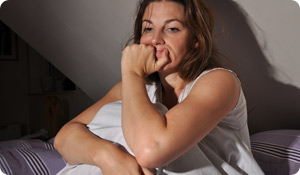
Not everyone who snores has sleep apnea, but everyone who has sleep apnea snores. If you're sawing logs at night, it's important to find out if it's just a noisy nuisance or a sign of a serious sleep disorder.
Snoring is a symptom of obstructive sleep apnea, a serious medical condition that results in blocked airflow while you sleep. If you have sleep apnea, your upper airway muscles relax while you sleep to the extent that the normal act of inhaling results in a collapsed windpipe. Though temporary, your airway can be blocked for up to a full minute and you have to struggle to breathe.
With sleep apnea, you may actually stop breathing. What may be heard as particularly loud snoring is really more of a gasp or a snort. In response to the disruption in the flow of oxygen, your brain wakes you up slightly, so that you automatically tighten your airway muscles, which opens your windpipe and allows you to breathe freely again. The next day, you may not remember waking up but you will probably feel tired.
Simple snoring, or primary snoring without sleep apnea, is a partial obstruction of the upper airway that results in noisy and sometimes rhythmic, heavy breathing but no complete blockage of airflow. Although it may disturb your sleep partner, simple snoring doesn't result in complete airway blockage and won't normally wake you up. If you don't feel tired during the day, but you've been told you snore and you sometimes wake up with a dry mouth, you probably experience simple snoring and don't have obstructive sleep apnea.
Although several studies published in the 1990's linked snoring with an increased risk of stroke, other research, including a British study published in a 2003 issue of the Journal of Sleep Research, found that the strong link was not between snoring and stroke but between daytime sleepiness and stroke. The researchers suggested that obstructive sleep apnea might play a role.
If you know you snore, or if you find yourself feeling drowsy and in need of a nap during the day and you don't know why, speak to your doctor. A physician can order a polysomnogram, or sleep study, which will measure your sleep patterns as well as your respiratory patterns and the amount of oxygen in your blood while you sleep. This is the best way to get to the root of the problem and find an appropriate solution. It's also the only way to find out if you have a sleep disorder that can threaten your mental and physical health.
In some cases, losing weight, changing your sleep position so you sleep on your side or in an elevated position, or avoiding alcohol and sedatives can help. If you can't make these lifestyle changes, or they don't work, there are oral devices you can wear while you sleep as well as surgical solutions.
Sources:
Davies, DP, et al.; "Snoring, Daytime Sleepiness and Stroke"; Journal of Sleep Research 2003 Dec;12(4)313-8 Web 14 Sept 2011
http://www.ncbi.nlm.nih.gov/pubmed/14633243
The Franklin Institute: The Effects of Snoring Web.14 Sept 2011
http://www.fi.edu/learn/brain/sleep.html#snoring
Stanford University: Snoring Information Web 14 Sept 2011
http://www.stanford.edu/~dement/snoring.html





